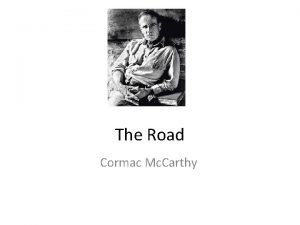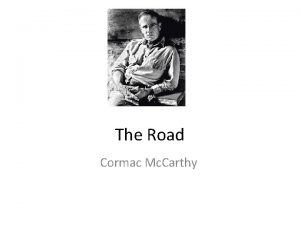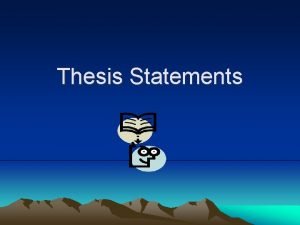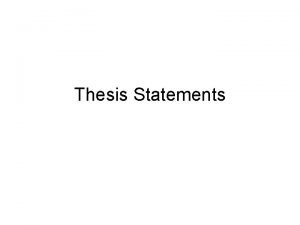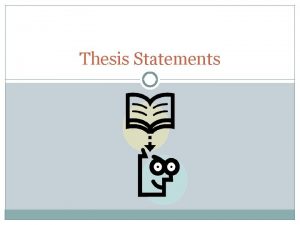What is the point of this thesis Cormac







- Slides: 7

What is the point of this thesis? Cormac Mc. Carthy (1933 -) There has been no attempt till date to study Mc. Carthy & King synoptically. They are our neo-evangelists. Who but scholars and fanatics read theology tomes? People read horror fiction and westerns. How many books are sold by T & T Clark ? Stephen King (1947 -) To underpin the need to see both Mc. Carthy & King as purveyors of theological truths within the U. S. mode of the Gothic. They individually study the Problem of Evil, the Sovereignty of the Good and locate these binaries within the woof of human-history…essentially writing on the same issues. A powerful critic like Harold Bloom(1930 -) has trashed King as a pulp-writer and praised Mc. Carthy William Faulkner

U. S. Fiction The two main modes of American Literature. H. P. Lovecraft Romance Gothic Yet the prevalent mode of the Gothic is not accepted The mode of the Gothic is a variation of the mode of the Romance. (Miller, Perry. ‘The Romance and the Novel’ in Nature’s Nation, Cambridge, Mass. : Harvard U. P. , 1967. 241 -78. Print. )

American fiction is primarily Gothic. It is not merely a Southern phenomenon, it is the norm in all of the United States Philip K. Dick (1928 - 82) Thomas Pynchon ( 1937 -) William Blatty ( 1928 - ) 1936 - Shirley Jackson ( 1916 – 65) Southern fiction has been seen as one of freakery 1. But the same is true for all American 1. Garland-Thomson, Rosemarie. "From Wonder to Error -- A Genealogy of Freak Discourse in Modernity. " Introduction. Freakery: Cultural Spectacles of the Extraordinary Body. Ed. Rosemarie Garland -Thomson. New York: New York UP, 1996. 1 -19. Print. Blatty’s The Exorcist (1973 ) was the movie that fed life to the neo. Gothic in the popular literature. imagination.

Cormac Mc. Carthy • Mc. Carthy’s westerns are nothing like any western ever written. Louis L’Amour (1908 – 88) never could create a Judge Holden or a John Grady Cole. Larry Mc. Murtry’s ( 1936 - ) Lonesome Dove (1985) pales in front of Mc. Carthy’s works. Mc. Carthy’s westerns debunk American Exceptionalism, Manifest Destiny and the Turner Thesis. His Blood Meridian (1985) is a long meditation on blood-thirst and human evil. No Country for Old Men (2005) has the sociopath Anton Chigurh who serially kills men, deciding their Judge Holden, Anton Chigurh by fates by flipping a coin. Stephen King • King’s novels and short stories are not typical American horror fiction. Jack Finney’s (1911 - 95) The Body Snatchers (1955) hardly deals with issues which matter : suicide, social ostracization, child-abuse, the impulse to rape, sadomasochism, mental health issues like schizophrenia and our innate need to act out violent fantasies. Mc. Carthy; Randall Flagg and Pennywise the Clown created by King are in their own ways the Christian 2 concept of Original Sin. They are Sin (sic) that stains the. Catholicism universe. 2. By Christianity is primarily meant Roman and theologies of some Protestant thinkers like Rudolf Bultmann, Karl Barth, Reinhold Niebuhr & Jürgen Moltmann. Roman Catholic theology opens up the space for several amenable theologies like moral, process, mystical and liberation theologies. Also the Catholic Church has a long tradition of engaging with evil, the attributes of the Godhead and the action of both evil and good within human history. The hermeneutics that need to be constructed for the purpose of this thesis will depend on our successful negotiations of these various theologies and their theodicies enacted within chronological time. For instance, the process theologian Roger Burggraeve’s concept of God as the wholly Other, the God of Lévinas, will be important to our analysis of both Mc. Carthy and King’s works. We shall have scope to refer to Karl Rahner sj & Henri de Lubac sj et al.

Evil is neither the telos of King’s or Mc. Carthy’s narratives, nor is it the telos of Western philosophy or Christian theology. This is in spite of the fact that the last century has been marked by genocides and the Shoah. Aristotle, Iris Murdoch and Emmanuel Lévinas have all commented on the ethical life which can only be achieved by foregoing something of value. Martha Nussbaum and Kwame Appiah make the case for cosmopolitanism. Therefore it is fitting that we interrogate the message of the sovereignty of the good in both Mccarthy & King.

The God of Christianity is an intensely personal God who participates in human history 3 and does not exist apart from humanity. The drama of salvation, or theodrama 4 is revealed within the confines of time. Mc. Carthy and King too situate their characters within history and in their apocalyptic novels transform for us philosophical, theological mysteries and abstractions into realities verifiable by common academic and The Christ-like figure of John Coffey from King’s The Green social registers. Thus they use their 3. The theological term for this is kerygma. genres informed by. Glory theof the Gothic mode Aesthetics. 4. Balthasar, Hans Urs Von. The Lord: A Theological Trans. Joseph Fessio. Ed. John Kenneth. Riches. San Francisco: Ignatius, to extend our fields of intelligibility 2009. Print. about the Problem of Evil, the Good

Conclusions v Stephen King and Cormac Mc. Carthy’s fiction uniquely transform the main mode of American fiction, that is the Gothic mode, to speak to us in our times of theological issues. They specifically comment on the Problem of Evil, the triumph of the Good and their dialectical interactions within history. v Both King and Mc. Carthy revise the American horror novel and the American Western by elevating these two genres into fluid spaces of spiritual discourses. This work has been undertaken as a personal passion inspired by a now deceased Aussie Christian Brother who renounced all for God at 15; a Canadian Jesuit who was a polyglot Ph. D and my spiritual Guru (living ) who follows the Hindu path of the Tantras (as laid down for instance, in The Mahanirvana Tantra) This work would not have been possible had not my supervisor allowed me my eccentricities and idiosyncrasies. She and her spouse have been there over the phone, emails and in person whenever I sought their help. She is an established American Studies scholar, but that is not her main forte. She is a contingent being who inspired me to excel in my Masters and now prods me to excel in fields as diverse as pedagogy, American studies & theology. Academic excellence comes after the qualities of eudamonia, otherwise such learning is nothing. Such individuals participate within the salvation history of humankind without themselves being aware of it. • The author has earned a Post Graduate Diploma in Biblical Theology from the Papal Seminary at Bangalore towards better understanding Catholic theology for the purpose of this thesis. His dissertation for the course was on the Gospel of Glory and the Hindu idea of God. • Further, the author earned another Post Graduate Diploma from the same Seminary in Formative Spirituality to understand the psychic apparatus of evil and the good within the human person, acting in the here and the now. His dissertation for this course was on Ignatian discernment, the psychology of choices appropriated within Hindu paradigms.









